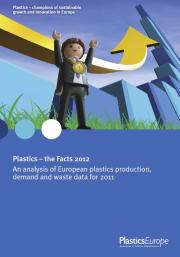plasticker-News
| 19.10.2012, 06:05 Uhr | Lesedauer: ca. 2 Minuten |

|
[Die folgende Meldung liegt nur in englischer Sprache vor]
PlasticsEurope: “Plastics - the Facts 2012” report now available
|
The plastics industry has set itself the challenging goal of reaching zero plastics going to landfill by 2020. However, the efforts of all stakeholders towards turning waste into a valuable resource - be it through recycling or energy recovery - need to be increased. Latest data say that with a business as usual approach, zero plastics to landfill would only be reached by the year 2037. Achieving the 2020 objective would prevent an estimated 80 million tonnes of plastic waste from going to landfill, an amount representing about 1 billion barrels of oil or around 78 billion Euros. This is one of the main conclusions drawn from the annual monitoring report "Plastics – the Facts 2012", which is published by PlasticsEurope, representing Europe’s plastics producers, European Plastics Converters (EuPC), European Plastics Recyclers (EuPR) and the European Association of Plastics Recycling and Recovery Organisations (EPRO). The report presents latest data on European plastics production, demand and waste data for 2011. The report is not all gloom and doom though overall progress has been achieved in capturing the value from plastics waste. In EU-27, 4.8% more post-consumer plastic waste was recovered compared to 2010. The amount of plastic waste ending up in landfills decreased in a similar way. The recovery rate reached 59,1% in 2011. However, the increase in recycling and energy recovery rate between 2006 and 2011 still varies a lot between EU Member States: The biggest improvement in recovery rate was achieved in Estonia with 45%, followed by Finland at about 30% during this five year period. The nine best countries in 2011 recovered more than 90% of their post-consumer plastic waste, while seven countries still recovered less than 30%. The plastics industry in total employed a workforce of 1.45 million in 2011, including 53.000 from the plastics machinery industry. With a total of €21 billion in income tax and social security costs, and €6.5 billion in corporate tax, the plastics industry generated about €27.5 billion in 2011 for public finance and welfare and is therefore an important pillar of economics and society. The full report can be downloaded here: www.plasticseurope.org/Document/plastics-the-facts-2012.aspx?FolID=2 More information: www.plasticseurope.org |
PlasticsEurope Deutschland e. V., Frankfurt am Main
» insgesamt 263 News über "Plasticseurope" im News-Archiv gefunden
Ihre News im plasticker? Bitte senden Sie Ihre Pressemitteilungen an redaktion@plasticker.de!
| » zurück zum Seitenanfang |












 Wir informieren Sie schnell, umfassend und kostenlos über das, was
in der Branche passiert.
Wir informieren Sie schnell, umfassend und kostenlos über das, was
in der Branche passiert.

